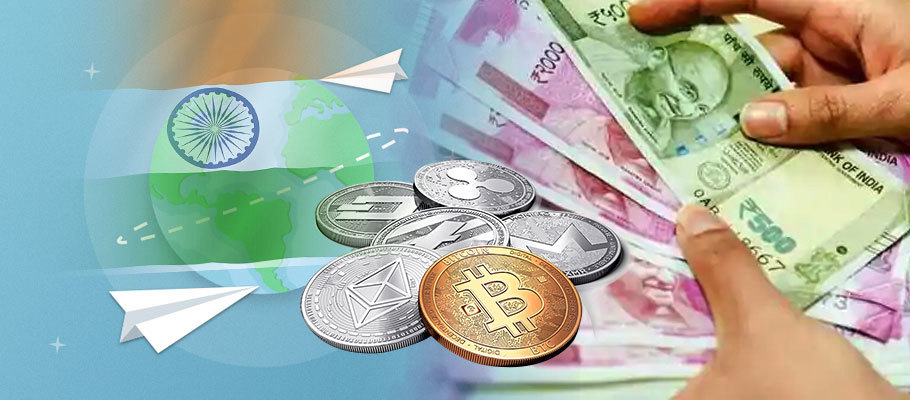
Published: July 10th, 2020
India has been ground zero for the ongoing debate about the primacy of paper money over digital currencies. One week, the country’s central bank is stopping commercial lenders from dealing in crypto and related assets. A month later, the Supreme Court halts the ban and keeps the door open for blockchain-related businesses.
This week, the country’s Finance Ministry is pushing back again – considering new laws to protect the role of traditional money.
But amid the back-and-forth of policy shifts, something’s changed. The coronavirus pandemic hammered one of India’s most significant sources of income – cash transfers sent home from Indian workers living abroad. With Covid-19 smashing economies everywhere, India – as well as Indonesia, Bangladesh, and the Philippines – is suffering a plunge in foreign remittances, cash crucial to consumer spending and keeping government coffers filled.
India’s reliance on foreign cash transfers is especially acute. Last year, Indians overseas wired home USD 83 billion, at an estimated average cost of 7 per cent. As jobs in London, Singapore, and Dubai dry up, a $13 fee for sending $200 home matters more than ever to struggling families trying to pay for food and health care.
Adopting distributed-ledger tech would make cash inflows more efficient and dramatically cut transaction costs. The long list of intermediaries taking their respective cuts from each transfer would be reduced. India's maze of financial regulations sometimes seems to serve only itself. Nothing would tip this rusty apple cart over faster than a move to properly legalize crypto.
But risk-averse policymakers are holding progress back, while across the border in China, a real crypto arms race is beginning to brew.
Here are four critical factors that could push Indian politicians to finally act.
As New Delhi looks to put the brakes on financial innovation, the wheels are turning ever faster in Shanghai, Hangzhou, and Beijing. Even Silicon Valley is keeping a nervous eye on crypto and blockchain’s rapid development in China, where significant innovations in global payments tech are already leaving G7 countries like Japan behind.
With its regional peers rocketing forward, India’s reluctance to embrace crypto looks less and less rational. It risks excluding from game-changing developments happening across the globe. Some industry watchers think India could become one of the biggest crypto markets on the planet. Why hand so much job- and wealth-creation to its number one geopolitical adversary?
The world’s biggest cryptocurrency exchange, Chinese-founded Binance, joined the fray earlier this year when it became a member of the Internet and Mobile Association of India – the crypto industry’s top lobby group in the country. Its CEO has said publicly he wants to contribute to shaping India’s crypto industry as a way to promote sustainable economic development. Your move, New Delhi.
India’s bureaucracy-heavy licensing regime for businesses of all sizes enables the national government to place a stranglehold on different kinds of commercial activity, as and when it wants. While the Modi government has made structural reform of the country's economy a central policy platform, little has been done to change this pillar of the Indian political status quo.
Superficially, its campaign against corruption and backhanders in the way business licenses are granted and renewed has made progress. India ranks 81st in the corruption perceptions index published annually by Transparency International, ranking alongside China. That’s up from the 90th spot ten years ago, but expectations have been higher. The extreme profiteering on COVID-19 test kits during the pandemic is proof positive for many observers that government graft is alive and well.
Alongside corruption, Indian financial regulators have struggled to get a grip on ‘black money,’ the estimated $1 trillion-plus-worth of hidden cash that moves across the economy out of view of tax authorities. One can easily imagine a blockchain-based system, regulated by New Delhi and India’s central bank, could harness that capital and the lost tax revenue it would recoup. Fraudsters would find it harder to worm their way through the banking system’s loopholes. Organized crime and money laundering would be easier to detect.
Central bankers from Brussels to Tokyo have embraced quantitative easing since the 2008 economic crisis. As a result of more than 12 years of negative interest rates, monetary policy has lost much of its power to transform. With the fallout from coronavirus cratering global growth, central banks are experimenting with aggressive stimulus tactics that are pushing the global economy into unchartered territory.
Embracing blockchain with the same enthusiasm could enable Indian central bankers to regain some of their policymaking power. Fiat currencies are a known quantity, but they are the mercy of shifts in business sentiment and consumer psychology.
If central banks push rates to or less-than-zero, people will take their cash out of the system and stuff it under mattresses. By reducing the supply of hard currency – notes and coins – and replacing them with digital money, monetary authorities would be better able to control the volume of cash in circulation, arguably with a granularity that would make it easier to hit policy objectives.
Major players from OPEC to Moscow and Beijing have been working to agree an alternative to the greenback for international settlement of major transactions. The simmering trade war between Beijing and Washington, plus Trump’s heated rhetoric and perceived recklessness on policy, are speeding up the search. U.S. government debt pushing past $24 trillion has also added urgency.
China is hoping the new e-RMB could become an Asia-wide digital currency. Fakebook’s Libra is also expected to land in the next 12 months. India needs to be part of these developments, perhaps by taking a leadership stance on DeFi, or decentralized finance.
With the potential to raise India’s financial and diplomatic profile and keep cash inflows flowing, a leading position on crypto would seem to be there for New Delhi’s taking.